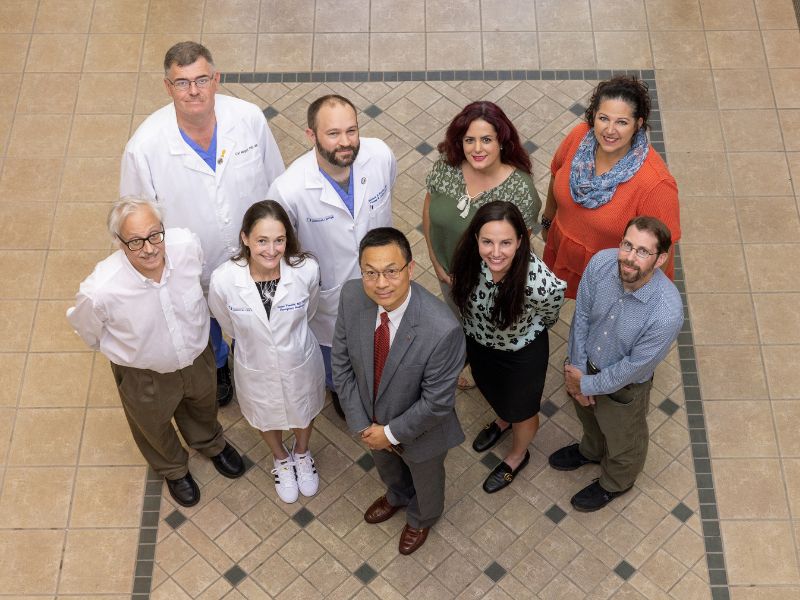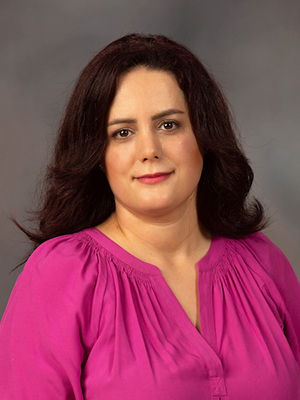Blue Ridge Institute for Medical Research ranks School of Nursing in top quarter for research funding

Two University of Mississippi Medical Center programs are ranked in the top quarter for National Institutes of Health funding by the Blue Ridge Institute for Medical Research (BRIMR).
The UMMC School of Nursing is ranked 24th among like programs in the country, with $4,286,296. It is the first time the School of Nursing has been ranked by BRIMR, joining other UMMC programs in this prestigious recognition. The Medical Center’s Department of Physiology is ranked 16th, with $11,219,132.
Also ranked are Cell and Molecular Biology (categorized by Blue Ridge as Biochemistry) at 63rd, Pharmacology at 51st, Medicine at 97th, Otolaryngology at 32nd, the School of Dentistry at 44th, Pediatrics at 76th, Psychiatry at 56th and Surgery at 70th. The School of Medicine’soverall ranking is 89th at $27,663,359.

“For UMMC, the rankings show not only our tremendous growth, but also the stability of our research programs,” said Cari Fowler, senior director of research operations at UMMC. “With the NIH being the largest public funder of biomedical research globally, the rankings, which are based solely on NIH funding, highlight our strengths and the influence our research can have on making Mississippi and the nation healthier.”
Every year since 2006, BRIMR, an independent nonprofit organization, has published rankings of institutions, departments, and investigators based on the funding they receive from the National Institutes of Health. The BRIMR standings are widely cited as a measure of scientific vitality and have been used to examine trends in funding to individual grantees and to academic specialties.
The School of Nursing’s listing is a testament to the school’s research team, said Dr. Lei Zhang, associate dean for research and scholarship, professor and Harriet G. Williamson Endowed Chair for Population Health Nursing.

“This ranking would not be possible without our strong team of faculty and students,” he said. “Our researchers are team players. This is a result of collaboration and teamwork across schools and departments within UMMC.”
Nursing research at UMMC also has benefited from strong leadership and support from Dr. Tina Martin, dean of the School of Nursing, and Dr. Lee Bidwell, associate vice chancellor for research, Zhang said.
Among the projects that added up to the School of Nursing’s ranking is the Mississippi Violence Injury Prevention Program (MSVIP), five-year project that is beginning its third year. The program, led by Zhang, Dr. Matthew Kutcher, associate professor, representing trauma, acute care surgery and critical care, and Dr. Laura Vearrier, professor of emergency medicine, seeks to decrease gun violence injuries and mortalities by working with community organizations as partners to address needs that could be contributing to gun violence.
During its first two years, researchers worked with the community partners to find contributing issues to gun violence injuries ranging from economic stress to mental health issues and began collaborating with community partners to learn more about what’s needed.
In the next three years, the study will move into a violence intervention and interruption phase that will help patients in recovery and support community groups in offering resources and information through local events.
“Our project will be evaluated to determine if there has been a decrease in firearm-related injuries and mortalities,” he said. “Our hope is that this will save lives and save money for the state.”
The ranking is exciting, said Dr. Masoumeh Karimi, assistant professor of nursing, noting that the School of Nursing has numerous projects, such as cervical cancer research led by Dr. Carolann Risley, associate professor of nursing, that aren’t figured into the BRIMR total.

“We have other research projects that are funded by other federal or state agencies that aren’t part of the ranking,” she said. “This variety of topics and funding sources reflects the comprehensive nature of the research being conducted at the School of Nursing.”
Research at the UMMC School of Nursing has other parts of the Medical Center’s three-fold mission – education and practice – woven into it, Zhang said.
“Nursing research tends to be translational research,” he said. “We support research that contributes to the educational mission of the School of Nursing and the practice of nursing. Collaboration on grant writing and research includes students as well as faculty to reach our goal of translating discovery into practice.”

Dr. John Hall, Arthur C. Guyton Professor and chair of the Department of Physiology and Biophysics, said his department has been “fortunate to receive fairly steady funding from the NIH for many years.”
Physiology has consistently been ranked in the top quarter by BRIMR since the start of the rankings and has been ranked fourth twice in the past decade.
“We have consistently been ranked among the top physiology departments in the country even though the number of faculty members in our department is much lower than most of the leading departments,” Hall said. “Also, our NIH funding has been relatively steady despite loss of several NIH-funded faculty members in the past 10 years due to retirements and moves to leadership positions in other departments and institutions. This continued steadiness of NIH funding has been due, in part, to the excellent mentoring programs in the department and its centers that help our new and senior investigators be more competitive with their grant applications.Although NIH funding continues to highly competitive, the Department of Physiology continues to contribute importantly to the total NIH funding of UMMC. We are extremely grateful to the NIH and to UMMC for supporting our research program.”


